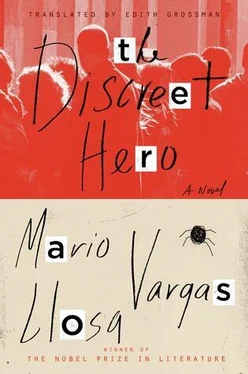Edilberto Torres didn’t seem very surprised, but the jitney driver was. He stepped lightly on the brakes and turned to look at the two passengers in the backseat. When he saw their faces, he calmed down. Señor Torres’s smile broadened, but he didn’t laugh out loud. He nodded, taking the matter as a joke.
“In our day everything’s possible,” he remarked in his perfect announcer’s diction, and shrugged. “The devil even wanders the streets of Lima and mobilizes his recruits on jitneys. Speaking of the devil, I’ve learned that you’ve become friends with Father O’Donovan, Fonchito. Yes, the one with a Bajo el Puente parish, who else. Do you get on well with him?”
“He was kidding you, don’t you see that, Lucrecia?” stated Don Rigoberto. “It’s a joke that he’d appear again in a jitney. And more than impossible that he’d mention Pepín. He was simply deceiving you. He’s been deceiving us from the very beginning, and that’s the truth.”
“You wouldn’t say that if you’d seen his face, Rigoberto. I think I know him well enough to know when he’s lying and when he’s not.”
“Do you know Father O’Donovan, señor?”
“On some Sundays I go to hear his Mass, even though his parish is fairly far from where I live,” replied Edilberto Torres. “I walk there because I like his sermons. They’re those of an educated, intelligent man who speaks to everybody, not just to believers. Didn’t he give you that impression when you chatted with him?”
“I’ve never heard his sermons,” Fonchito explained. “But yes, he seemed very intelligent. Experienced in life and especially in religion.”
“You ought to hear him when he speaks from the pulpit,” advised Edilberto Torres. “Especially now that you’re interested in spiritual matters. He’s eloquent, elegant, and his words are full of wisdom. He must be one of the last good orators the Church has. Because sacred oratory, so important in the past, entered its decadence a long time ago.”
“But he doesn’t know you, señor,” Fonchito dared to say. “I spoke about you to Father O’Donovan, and he didn’t even know who you were.”
“For him I’m just another face among the faithful in his church,” replied Edilberto Torres, very calmly. “A face lost among many others. How good that you’re interested in religion now, Fonchito. I’ve heard that you’re part of a group that meets once a week to read the Bible. Do you enjoy doing that?”
“You’re lying to me, darling,” Señora Lucrecia reprimanded him lovingly, trying to conceal her surprise. “He couldn’t have said that to you. It isn’t possible for Señor Torres to know about your study group.”
“He even knew that last week we finished reading Genesis and began Exodus.” Now the boy’s face was very worried. He too seemed disturbed. “He even knew that detail, I swear. It surprised me so much I told him it did, Stepmother.”
“There’s no reason for you to be surprised, Fonchito,” Edilberto Torres replied with a smile. “I think very highly of you, and I’m interested in knowing how things are going for you in school, in your family, in life. That’s why I do my best to find out what you’re doing and whom you see. It’s an expression of affection for you, nothing more. Don’t make a mountain out of a molehill. Do you know that saying?”
“He’ll hear from me when he gets home from school,” said Don Rigoberto, suddenly enraged. “Fonchito can’t keep toying with us this way. I’m sick and tired of his trying to make us swallow so many lies.”
In a bad mood, he went to the bathroom and washed his face with cold water. He sensed something unsettling, had a premonition of new unpleasantness. He’d never believed that human destiny was written, that life was a script that human beings acted in without knowing it, but ever since Ismael’s ill-fated marriage and the alleged appearances of Edilberto Torres, he’d had the feeling he’d glimpsed predestination. Could his days be a sequence predetermined by a supernatural power, as the Calvinists believed? The worst thing on that ominous Tuesday was that the family’s headaches had only just begun.
They sat down at the table. Rigoberto and Lucrecia were silent; they wore funereal faces, and reluctantly picked at a salad, totally without appetite. Then Justiniana burst into the dining room without knocking.
“You’re wanted on the phone, señor.” She was very excited, her eyes sparkling as they did on important occasions. “It’s Señor Ismael Carrera, no less!”
Rigoberto jumped up. Almost stumbling, he went to take the call in his study.
“Ismael?” he asked eagerly. “Is that you, Ismael? Where are you calling from?”
“From here, Lima, where else,” his friend and former boss replied in the same unconcerned, jovial tone he’d used in his last call. “We arrived last night and are impatient to see you both, Rigoberto. But since you and I have so much to talk about, why don’t just the two of us get together right away. Have you had lunch? All right, then come and have coffee with me. Yes, right now, I’ll expect you here at my house.”
“I’ll be right there.” Rigoberto said goodbye like an automaton. “What a day, what a day.”
He didn’t taste another mouthful and rushed out, promising Lucrecia he’d come back immediately and tell her all about his conversation with Ismael. The arrival of his friend, the source of all the conflicts in which he found himself entangled with the twins, made him forget about his interview with the investigating magistrate and the reappearance of Edilberto Torres on a Lima — Chorrillos jitney.
The silly old man and his brand-new wife had finally returned from their honeymoon. Had he been kept up to date by Claudio Arnillas about all the problems the hyenas’ persecution was causing him? He’d speak to Ismael frankly, tell him enough was enough, that ever since he’d agreed to be his witness, his life had turned into a judicial and police nightmare, that he had to do something immediately to make his sons stop their harassment.
But when he reached the neocolonial mansion in San Isidro, almost squashed by the buildings around it, Ismael and Armida received him with so many demonstrations of friendship that his intention to speak clearly and forcefully collapsed. He marveled at how serene, happy, and elegant the couple looked. Ismael was in casual clothes, a silk ascot around his neck, and sandals that must have felt like gloves on his feet; his leather jacket matched the soft-collared shirt, from which rose his smiling face, recently shaved and scented with a delicate anise fragrance. Even more extraordinary was the transformation in Armida. She seemed to have recently emerged from the hands of expert hairdressers, makeup artists, and manicurists. Her formerly black tresses were now chestnut, and a charming wave had replaced her straight hair. She wore a light print dress, with a lilac shawl over her shoulders, and medium-heeled shoes of the same color. Everything about her, her cared-for hands, the pale red nails, her earrings, her fine gold chain, the brooch on her chest, even her confident manner — she greeted Rigoberto, offering her cheek for him to kiss — was that of a lady who’d spent her life among well-mannered, rich, worldly people and was devoted to caring for her body and wardrobe. To the naked eye, there was no trace left in her of the former domestic employee. Had she dedicated the months of her European honeymoon to receiving lessons in deportment?
As soon as the greetings were concluded they led him into the room next to the dining room. Through the large window one could see the garden filled with crotons, bougainvillea, geraniums, and floripondios. Rigoberto noticed that beside the table, where the cups, coffeepot, and a serving dish of cookies and pastries were arranged, were several packages, large and small boxes beautifully wrapped in fancy paper and ribbons. Were they gifts? Yes. Ismael and Armida had brought them for Rigoberto, Lucrecia, Fonchito, and even Justiniana in gratitude for the kindness they’d shown the bride and groom: shirts and silk pajamas for Rigoberto, blouses and shawls for Lucrecia, athletic clothes and sneakers for Fonchito, a dustcoat and sandals for Justiniana, in addition to sashes, belts, cuff links, datebooks, handmade notebooks, engravings, chocolates, art books, and an erotic drawing to hang in the bathroom in the privacy of one’s own home.
Читать дальше

![Гарри Гаррисон - Bill, the Galactic Hero [= The Starsloggers]](/books/87536/garri-garrison-bill-the-galactic-hero-the-star-thumb.webp)










